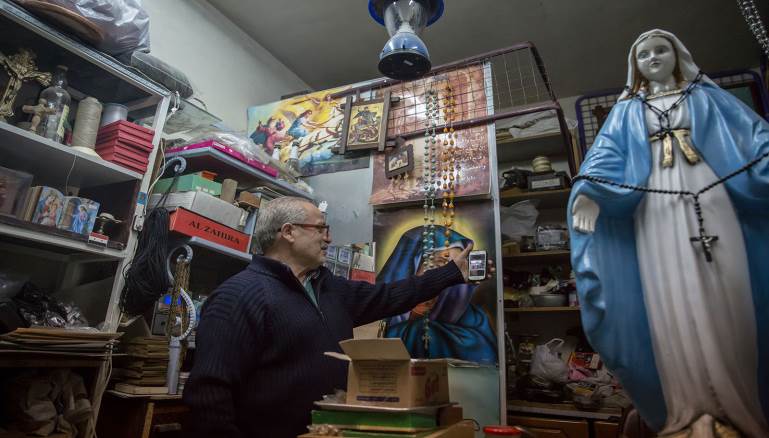The town of Mhardeh, which is majority Christian, lies to the northwest of Hama city, near the front lines of the ongoing fighting in the northern Hama countryside. Over time, the town has turned into a center for regime militias to gather, which use the Mhardeh monastery as a site for the heavy artillery that it uses to bombard opposition positions, which the opposition often responds to with similar bombardments.
The local pro-regime National Defense militia led by Simon al-Wakeel uses Mhardeh as a center. Before the recent outbreak of fighting, Wakeel and his militia shifted their allegiance from Iran to Russia.
Samya, a women from Mhardeh, told Al-Modon that: “These day, the people of Mhardeh are going to sleep scared and if they do sleep, they wake up scared.” They fear death or the unknown. “What is happening here is a real war, with no truce at night or by day. The sounds alone are terrifying. We’re hit with bombardments and we see and read that the battle is getting closer day by day.”
Yusuf, Samya’s husband, continued, saying: “Even in our worst nightmares, the residents of this city did not imagine they would live through these days. People in the past were professional in their work and in educating their children. Education was the main preoccupation of people here.” He adds: “Although the villages around us went out in the protests, we felt that we were far from all that, and that we wouldn’t get anything from it. Therefore we’ve been living beyond anything conceivable or imaginable.”
The “backward” neighbors?
Regarding the city’s relationship with its neighbors, Daniel, a young man from Mhardeh, told Al-Modon: “Before 2011, Mhardeh’s relationships with everyone were good. The city had its schools and hospitals and services were open for everyone. We were enjoying warm relations to an extent with everyone. But honestly, these relations were superficial, since we knew—and they knew as well—that we were different from one another. I’m speaking here on the level of social and cultural relations. Some of the young generation found that the western countryside of Mhardeh was closer to them that the eastern and northern countryside, especially on a social level.”
The eastern countryside is inhabited by Sunnis, while the western is inhabited by Alawites.
Samya, whose opinion overlaps with Daniel’s says: “This kind of comparison and talk is especially common with young people. I haven’t noticed it with our parents and grandparents. I think they were simpler and more socially flexible.”
Will arms enter Mhardeh?
With regards to this point, Yusuf, a town resident says: “In summer 2016, the northern Hama countryside was the stage for major military operations. Militants were able to advance and take large areas from the regime, including the neighboring town of Halfaya and al-Laseeqa near Mhardeh—that is, our town became a direct line. Ahead of the army’s retreat, we were watching the news to learn what our fate would be.”
“At the time,” Yusuf adds, “there was a report on one of the channels from Halfaya, in which one of the gunmen appeared, and reassured the people of Mhardeh that they would be fine and treated better, because they are Dhimmis and believe in the Holy Book.” [Dhimmis is a historical term referring to non-Muslims living in an Islamic state with legal protection. The word literally means “protected person”].
This, Yusuf adds, was very concerning as people of Mhardeh, “will not accept that anyone has a higher status in their country, just because he is Muslim, let alone the Turkistani, Chechen, Arab and others who are fighting with the militants.” Therefore, the people did not react positively, according to Yusuf, “to the recent reassurance issued by a leader of the army of pride to the people of Mhardeh.”
Russia provides protection, not the regime
Jamal, who is from Mhardeh, believes that Russia is the one, “preventing a terrifying scenario for Mhardeh’s people—that is, their city falling into the hands of militants.” He told Al-Modon: “Certainly the regime army will push the militants from Mhardeh, but without the Russians the battle today wouldn’t even exist because three years ago things were settling in favor of the militants. The regime and Russia are together, and so they are failing to achieve any real gains.
According to Jamal, some believe that: “The interest in us by the Russians relates to the fact that the residents are Christians and threatened.” But he believes that, “states have no doctrine—their interests are their doctrine.” Despite that, Jamal believes that, “Russia is taking part, along with Turkey, in the latest bloodshed and terror. But of the people here believe the matter is as follows: If the atmosphere was quiet between Putin and Erdogan, the villages and towns of Idleb and the northern Hama countryside would be quiet—and the reverse is also true. Now, there is talk about a truce and stopping the war. We don’t know what the details are or their extent, but I believe that these issues create a degree of harmony between the Turks and Russians. This means that Russia, which is protecting us, is also putting us in danger when its interests call for that.”
This article was translated and edited by The Syrian Observer. Responsibility for the information and views set out in this article lies entirely with the author.


